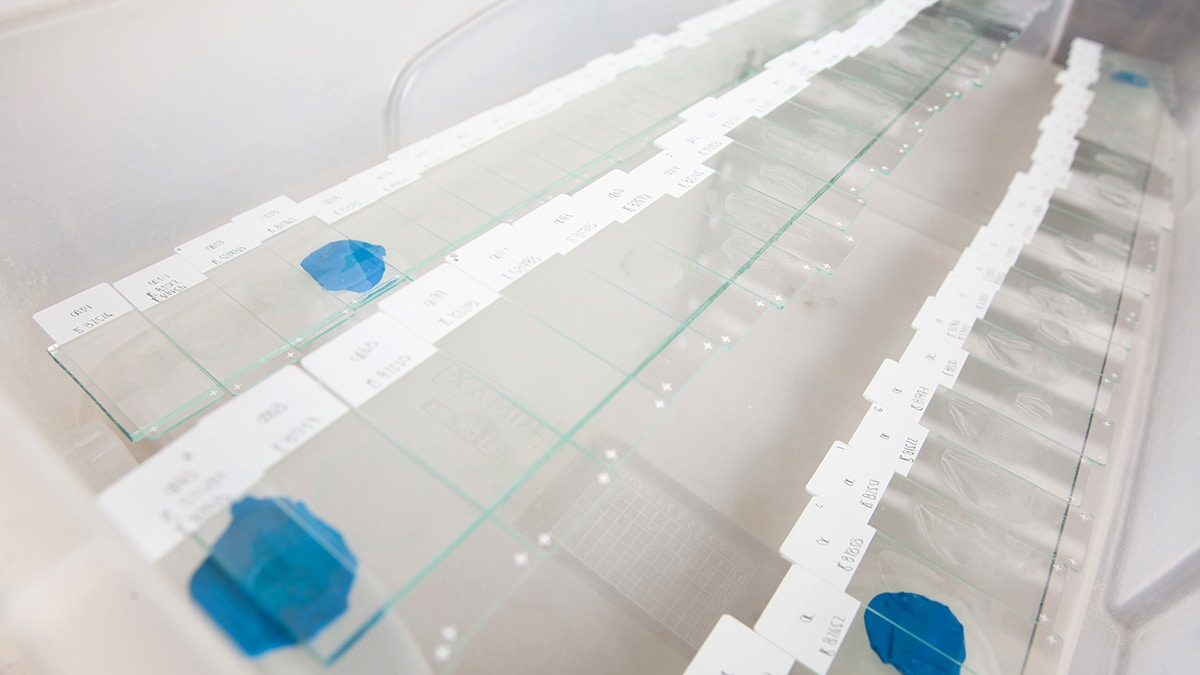At a glance
When a person is diagnosed with colorectal (colon) or uterine (endometrial) cancer, their tumor tissue can be screened to see if their cancer was caused by Lynch syndrome. There are two types of Lynch syndrome tumor screening: Immunohistochemistry (IHC) and microsatellite instability (MSI) testing.

When to get screened
When a person is diagnosed with colorectal (colon) cancer, their tumor tissue is often screened to see if their cancer was caused by Lynch syndrome. In some cases, when a woman is diagnosed with uterine (endometrial) cancer, her tumor tissue may be screened as well. The tumor tissue used for screening comes from tissue removed during a biopsy or surgery.
Types of tests
Immunohistochemistry screening (IHC)
IHC screening looks to see if certain proteins are absent in the tumor sample, indicating that one of the Lynch syndrome genes might not be working properly. Lynch syndrome genetic changes affect whether the MLHL, MSH2, MSH6, and PMS2 proteins are made and located in the correct place.
Test results, their meanings, and the next steps
Test result: Absent MLH1 and PMS2 proteins
What it means
Test could not determine if you are likely to have Lynch syndrome.
Next step
Further testing needed.
Test result: Absent MSH2 and MSH6 proteins
What it means
You are likely to have Lynch syndrome.
Next step
Genetic counseling and testing.
Test result: Absent MSH6 protein
What it means
You are likely to have Lynch syndrome.
Next step
Genetic counseling and testing.
Test result: Absent PMS2 protein
What it means
You are likely to have Lynch syndrome.
Next step
Genetic counseling and testing.
Test result: All 4 proteins present
What it means
You are unlikely to have Lynch syndrome.
Next step
No additional testing is needed, unless you have a strong family history of colorectal cancer, or had colorectal (colon) cancer before age 50.
Microsatellite Instability (MSI) screening
MSI screening is used to see if the Lynch syndrome genes are working properly. Microsatellites are regions of repeated DNA that change in length (show instability) when mismatch repair is not working properly. MSI testing looks at the length of certain DNA microsatellites from the tumor sample to see if they have gotten longer or shorter as a measure of instability.
Test results, their meanings, and the next steps
Test result: MSI high (MSI-H)
What it means
You are likely to have Lynch syndrome.
Next step
Genetic counseling and testing.
Test result: MSI low (MSI-L)
What it means
The test could not determine if you are likely to have Lynch syndrome.
Next step
Genetic counseling and testing.
Test result: MSI stable (MSI-S)
What it means
You are unlikely to have Lynch syndrome.
Next step
No genetic counseling is needed, unless you have a strong family history of colorectal cancer, or had colorectal cancer before age 50.
After you get your results
Not everyone with an abnormal IHC or MSI result will have Lynch syndrome, and additional testing may be necessary if a tumor screens positive. Genetic counseling and testing for Lynch syndrome may be recommended if your tumor screening results are abnormal. If you are unsure whether or not your tumor has been checked for Lynch syndrome, talk to your healthcare provider.
